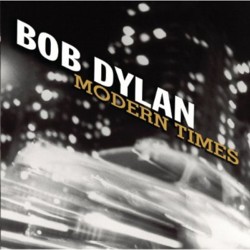|
|
|
|
 |
||
|
|
|
I fucking love Bob Dylan. A lot of people do, I mean, just last week I saw three songwriters who acted just like him. The Dylan presence was undeniable. Oddly, I didn't feel the need to scream at them, "Plagiarism!" And then I saw two songwriters perform who didn't act like him at all and I reacted with disgust, saying to myself, "Christ! Go home and listen to some Bob Dylan and then come back and try to tell me something about myself." That's when it dawned on me that Dylan has become more than the great musician, songwriter and poet, obviously, but he's even gone beyond being the icon of icons. He's a genre.
With 1997's Time Out of Mind, 2001's Love and Theft, and now, Modern Times, Dylan has created a trilogy of albums with a similar thread and vein. Perhaps it's a sub-genre of his career -- one where a lot of the lyrics are almost stream of consciousness rants or dreamy tales, and where his band sounds like just about every band Dylan has ever had: point blank, undeniably rooted in traditional music, but miraculously they still somehow manage to sound fresh and unique. Dylan's vocal delivery is as pertinent as ever, giving the simplest words poignancy and profound meaning (remember you might not like his voice, but he's a great, great singer), even if the lyrical direction is not so linear or cohesive. He takes you on a long ride where you might question where you are going, but then out nowhere he crushes you with two lines that vividly show you exactly where you are.
Like Time Out of Mind and Love and Theft, I would say that arguably every song on Modern Times is good. More confidently I would say half the songs are really great. But here's the deal with the album as a whole: Dylan captures what he's done best throughout his career -- he conveys what it means to be human. He still conveys exactly, whether we like it or not, good or bad, what we're feeling. And sadly, I can't find another songwriter that is even on his level now. It's so rare to hear the sincerity and desperation that comes across so powerfully on "Nettie Moore." It's both bizarre and uplifting to hear Dylan, the old man, croon and swing with love drunk euphoria on "Spirit on the Water." And you have those cynical days like on "Rollin' and Tumblin" or "Someday Baby" where your bitter tongue lashes out and you just don't care to apologize. It's all laid out in front of you on the first track, "Thunder on the Mountain" where we don't know why he's thinking about Alicia Keyes, and when he says, "Shame on your greed" you don't know if he's the hero or the villain. And when he's says, "I've already confessed once, no need to confess again" you feel both empowered and appalled. But that's it, Dylan, like any of us, is filled with contradictions, mystery and imperfections.
But of course, an important question lingers -- would anyone listen to this album if it wasn't Bob Dylan -- the painter of so many masterpieces? I think Bob answered that a long time ago when he sang some simple words that none of us could ever imagine saying better, "I can't help it if I'm lucky."
related articles
Blog: Video: Bob Dylan - "Duquesne Whistle"
Blog: The Mystery of Jerry Garcia & Merl Saunders' "Positively 4th Street"
Blog: State of Mind's Best of 2009 - Mike McKinley
Blog: Dose of Dylan - "Sad-Eyed Lady of the Lowlands" and the dream
Blog: Dose of Dylan - "Most of the Time"
More on: Bob Dylan
Blog: Video: Bob Dylan - "Duquesne Whistle"
Blog: The Mystery of Jerry Garcia & Merl Saunders' "Positively 4th Street"
Blog: State of Mind's Best of 2009 - Mike McKinley
Blog: Dose of Dylan - "Sad-Eyed Lady of the Lowlands" and the dream
Blog: Dose of Dylan - "Most of the Time"
More on: Bob Dylan
new to state of mind
Shows: moe.
Shows: Yonder Mountain String Band
Shows: Grand Point North 2014
Shows: Catskill Chill 2014
Shows: moe.down 15
Shows: Gov't Mule
Shows: Umphrey's McGee
Shows: Newport Folk Festival 2014
Shows: Widespread Panic
Albums: Phish - Fuego
Shows: moe.
Shows: Yonder Mountain String Band
Shows: Grand Point North 2014
Shows: Catskill Chill 2014
Shows: moe.down 15
Shows: Gov't Mule
Shows: Umphrey's McGee
Shows: Newport Folk Festival 2014
Shows: Widespread Panic
Albums: Phish - Fuego
most popular
Blog: New Video/Song From Dr. Dog - "Broken Heart"
Blog: Radiohead: Adam King tries to convince me they are aliens…
Blog: Mountain Oasis welcomes NIN‚ Bassnectar and Pretty Lights
Blog: Mehliana Tour (Brad Mehldau + Mark Guiliana)
Blog: Video: Club d'Elf with Marco Benevento - "Bass Beatbox"
Blog: Reed Mathis and Victor Wooten Talk Bass
Features: Conversation with Kurt Rosenwinkel
Features: Conversation with Tommy Benedetti of John Brown's Body
Features: Conversation with Bill Kreutzmann
Shows: Rothbury 2009
Blog: New Video/Song From Dr. Dog - "Broken Heart"
Blog: Radiohead: Adam King tries to convince me they are aliens…
Blog: Mountain Oasis welcomes NIN‚ Bassnectar and Pretty Lights
Blog: Mehliana Tour (Brad Mehldau + Mark Guiliana)
Blog: Video: Club d'Elf with Marco Benevento - "Bass Beatbox"
Blog: Reed Mathis and Victor Wooten Talk Bass
Features: Conversation with Kurt Rosenwinkel
Features: Conversation with Tommy Benedetti of John Brown's Body
Features: Conversation with Bill Kreutzmann
Shows: Rothbury 2009
